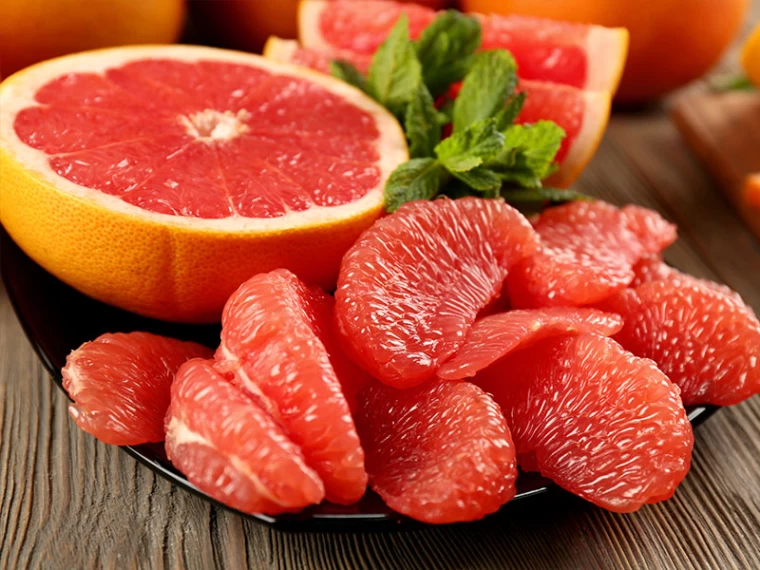Lemon juice is one of the oldest and most well-known natural drinks, derived from the extract of the lemon fruit. This drink is popular worldwide due to its sour and refreshing taste, as well as its numerous health benefits. Lemons are rich in vitamin C and powerful antioxidants that can help boost the immune system, maintain skin health, and improve digestive function. Below, we explore 8 important properties of lemon juice and its nutritional value, also several recipes for lemon tea.
Boosting the Immune System
One of the most prominent benefits of lemon juice is boosting the immune system. This drink is rich in vitamin C, which helps increase the number of white blood cells. White blood cells are responsible for fighting infections and diseases. Regular consumption of lemon juice can help reduce the incidence of colds, flu, and other viral infections.
Improving Digestive Health

Lemon juice acts as a natural stimulant for the digestive system. It helps stimulate bile production in the liver, making food digestion easier. The antiseptic properties of lemon juice also help cleanse the digestive tract, reducing the likelihood of issues such as bloating and indigestion.
Antioxidant Properties
Lemon juice is a rich source of antioxidants that help protect the body's cells from damage caused by free radicals. Antioxidants help reduce inflammation, prevent heart disease, and even protect the skin from signs of aging. Regular consumption of lemon juice helps maintain overall health and prevent chronic diseases.
Aiding Weight Loss
One of the well-known benefits of lemon juice is aiding weight loss. This drink increases the body's metabolism and helps burn fat. Lemon juice also increases the feeling of fullness and reduces appetite, making it useful for weight control. Adding lemon juice to your daily diet is a natural and effective way to lose weight.
Improving Skin Health
Due to its vitamin C and antioxidant content, lemon juice helps improve skin health. Its consumption can reduce spots, dark circles, and wrinkles, making the skin clearer and more radiant. The antiseptic properties of lemon juice also help speed up the healing process of pimples and acne.
Regulating Blood Pressure
Regular consumption of lemon juice helps regulate blood pressure levels. Lemons contain potassium, which aids muscle contractions and keeps blood pressure within a healthy range. People with high blood pressure can help regulate their blood pressure by including lemon juice in their diet.
Maintaining Heart Health
Lemon juice helps maintain heart health by reducing bad cholesterol (LDL) and increasing good cholesterol (HDL). Consuming lemon juice can prevent the formation of fatty plaques in the arteries, thereby reducing the risk of heart disease and stroke. The antioxidants in lemons also help strengthen the heart and circulatory system.
Detoxifying the Body
Lemon juice acts as a detoxifier, helping cleanse the liver and kidneys of waste products. This detoxifying property can improve overall body function and increase energy levels. Consuming lemon juice, especially in the mornings, helps speed up the body's detoxification process.
Lemon’s Benefits for the Liver

Due to its cleansing and detoxifying properties, lemon is one of the best natural substances for supporting liver health. Here, we examine the specific benefits of lemon for the liver:
Detoxifying and Cleansing the Liver
One of the liver's main functions is filtering toxins and waste products from the blood. Consuming lemon juice can aid the liver's detoxification process. Lemons contain citric acid, which helps increase bile production in the liver. Bile is a substance that aids in fat digestion and toxin elimination from the body. Daily consumption of lemon juice on an empty stomach can stimulate the liver and help eliminate toxins, improving liver function.
Preventing Fat Accumulation in the Liver
Fatty liver is a common liver issue caused by excessive fat accumulation in liver cells. Due to its fat-reducing and detoxifying properties, lemon juice can help prevent fat formation in the liver. The antioxidants in lemons help reduce inflammation and prevent oxidative damage in liver cells.
Regulating Liver Enzyme Levels
Consuming lemon juice can help regulate liver enzyme levels. Elevated liver enzyme levels may indicate liver damage or inflammation. The powerful antioxidants in lemons, especially vitamin C, help protect the liver from damage caused by inflammation and oxidative stress. Therefore, lemon juice is recommended as a natural method for maintaining healthy liver enzyme function.
Fighting Liver Inflammation
The liver is prone to inflammation due to exposure to various toxins. Lemons have strong anti-inflammatory properties that can help reduce liver inflammation. This property is particularly beneficial for people suffering from chronic liver diseases such as hepatitis or fatty liver. Regular consumption of lemon juice helps reduce inflammation and improve liver function.
Protecting the Liver from Alcohol and Drug-Induced Damage
Alcohol and certain medications can damage the liver and disrupt its normal function. Due to its strong antioxidant properties, lemon can protect the liver from damage caused by alcohol and drugs. Consuming lemon juice along with healthy, balanced foods can help improve and repair the liver in people with alcohol and drug-induced liver damage.
Enhancing Digestion and Reducing Liver Strain
The liver plays a key role in digestion, with bile production being one of its main functions. Consuming lemon juice helps stimulate bile production and facilitates the digestion process. This reduces the strain on the liver for bile production and food digestion. As a result, liver function improves, and the body can better absorb nutrients overall.
Antibacterial and Antiviral Properties
Due to its antibacterial and antiviral properties, lemon can help fight liver infections. Some liver diseases, such as viral hepatitis, may be caused by viruses or bacteria. Regular consumption of lemon juice can help cleanse the liver and protect it from various infections.
Preventing Oxidative Stress Damage
Oxidative stress is one of the main factors causing cellular damage in the liver. This condition occurs when free radicals increase in the body, causing damage to liver cells. Lemon juice contains high amounts of antioxidants that can neutralize free radicals and protect the liver from oxidative stress damage.
Lemon’s Benefits for the Kidneys
Due to its beneficial compounds, lemon is recognized as one of the best natural substances for supporting kidney health and preventing kidney stone formation. Here, we examine the complete benefits of lemon for the kidneys and kidney stones:
Preventing Kidney Stone Formation
Kidney stones usually form from the accumulation of minerals, especially calcium and oxalate, in the kidneys. One of the most important compounds in lemons is citric acid. Citric acid helps prevent the formation of kidney stones. Regular consumption of lemon juice can increase citric acid levels in the urine, thereby reducing the risk of kidney stone formation.
Increasing Urine Volume and Alkalizing Urine
Drinking lemon juice can help increase urine volume and make it more alkaline. Increased urine volume helps dilute the minerals in the urine, reducing their accumulation and the likelihood of kidney stone formation. Additionally, the citric acid in lemons can change the pH of urine to a more alkaline state, helping prevent the formation of acidic stones (such as calcium oxalate and uric stones).
Diuretic Property
Lemon has a natural diuretic property. This property helps increase urine production, thereby washing the kidneys and eliminating toxins and waste products from them. This function reduces the likelihood of mineral accumulation and kidney stone formation and also helps cleanse the renal system.
Preventing Urinary Tract Infections
Urinary tract infections can lead to or exacerbate kidney problems. Due to its antibacterial and anti-inflammatory properties, lemon can help reduce the risk of urinary tract infections. Consuming lemon juice can help maintain overall urinary tract health and prevent issues such as inflammation or recurrent infections in this area.
Facilitating Kidney Stone Elimination
For people suffering from kidney stones, regular consumption of lemon juice can help facilitate the elimination of small stones and prevent their growth. Due to its diuretic and alkalizing properties, lemon juice may help stones pass more easily through urine, reducing the pain and problems associated with kidney stones.
Reducing Pain and Inflammation
Consuming lemon may help reduce the pain and inflammation caused by kidney stones. The anti-inflammatory compounds in lemons can help soothe inflammation in the kidney tissues and urinary tract, reducing the pain caused by passing kidney stones. This property is particularly beneficial for individuals with small stones.
Helping Maintain Electrolyte Balance
Lemons contain potassium, an essential mineral for maintaining electrolyte balance in the body and especially for proper kidney function. Potassium helps regulate blood pressure, muscle function, and liquid balance in the body. By consuming lemons and receiving an adequate amount of potassium, the kidneys can more effectively filter toxins and eliminate waste products from the body.
How to Use Lemon for Preventing and Treating Kidney Stones
To benefit from the properties of lemon in preventing and treating kidney stones, the best method is to drink diluted lemon juice. A glass of lemon water (mixing the juice of half a lemon with a glass of water) can be consumed on an empty stomach or throughout the day. This drink can also be added to teas or salads.
Nutritional Value of Lemon Juice
|
Nutrient |
Amount in 100 grams of lemon juice |
|
Energy |
29 calories |
|
Carbohydrates |
9.32 grams |
|
Protein |
1.1 grams |
|
Fat |
0.3 grams |
|
Fiber |
2.8 grams |
|
Vitamin C |
53 milligrams |
|
Potassium |
138 milligrams |
|
Calcium |
26 milligrams |
|
Iron |
0.6 milligrams |
Introducing 5 Lemon Tea Recipes
- Ginger and Lemon Tea
Ingredients: 1 teaspoon grated fresh ginger, 1 cup boiling water, juice of half a lemon
Preparation: Add ginger to boiling water and brew for 5 minutes. Then add lemon juice and enjoy the tea. This tea helps improve digestion and increase energy.
- Lemon and Mint Tea
Ingredients: A few fresh mint leaves, 1 cup boiling water, juice of half a lemon
Preparation: Add mint to boiling water and brew for 3 to 5 minutes. Then add lemon juice and enjoy the tea either hot or cold. This tea provides relaxation and cools the body.
- Lemon and Honey Tea
Ingredients: 1 teaspoon natural honey, 1 cup boiling water, juice of half a lemon
Preparation: Dissolve honey in boiling water and then add lemon juice. This tea helps boost the immune system and soothe coughs and sore throats.
- Lemon and Turmeric Tea
Ingredients: Half a teaspoon of turmeric, 1 cup boiling water, juice of half a lemon
Preparation: Dissolve turmeric in boiling water and add lemon juice. This tea has anti-inflammatory properties and helps detoxify the body.
- Lemon and Cinnamon Tea
Ingredients: 1 cinnamon stick, 1 cup boiling water, juice of half a lemon
Preparation: Place the cinnamon stick in boiling water and brew for 10 minutes. Then add lemon juice. This tea helps regulate blood sugar and increase energy.
Summary
Lemon juice is a natural and beneficial drink that can help boost the immune system, improve digestive health, skin, heart, and aid in weight loss. Regular consumption of lemon juice can also help detoxify the body and reduce inflammation. By incorporating this drink into your daily diet and preparing various teas with it, you can enjoy its remarkable benefits.
Frequently Asked Questions
- Is daily consumption of lemon juice harmful?
No, daily consumption of lemon juice in moderate amounts is beneficial for most people. However, due to its high acidity, excessive consumption may damage tooth enamel. It's best to dilute lemon juice and drink it with a straw.
- Does lemon juice help with weight loss?
Yes, lemon juice helps with weight loss by increasing metabolism and reducing appetite.
- When is the best time to consume lemon juice?
The best time to consume lemon juice is in the morning on an empty stomach. This helps detoxify the body and improve digestion.
- Does lemon juice help improve acne?
Yes, lemon juice can help improve acne due to its antibacterial and antioxidant properties.
- How can lemon juice be incorporated into a daily diet?
You can add lemon juice to teas, salads, drinking water, or daily meals to enjoy its benefits.





